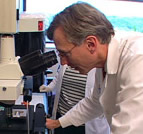Patient advocates help shape cancer research agenda
Taking A Stand
Maria Lyzen's husband, Michael, never accompanied her to doctor's appointments until she developed breast cancer. It was only then that he saw Maria, a nurse, making decisions together with her doctor. For him, doctors were people who simply told him what to do. And he did it.
Medical culture has shifted. Patients and doctors alike have learned that better care comes from better relationships. This same attitude is filtering through to medical research with the establishment of patient advocacy committees to guide physician-scientists in their efforts to find better ways to treat cancer.
"It's very empowering when you partner with your physician," Maria Lyzen said. "It's also very empowering when you partner with researchers.

"Lyzen co-chairs the U-M Breast Cancer Advocacy & Advisory Committee with Ruth Freedman, a fellow breast cancer survivor. The group was formed four years ago to bring patients and researchers together to develop better study protocols and promote awareness about clinical trials.
Daniel F. Hayes, M.D., clinical director of the Breast Oncology Program at the U-M Rogel Cancer Center, initially led the efforts to form the group, believing that patients needed a strong voice in how clinical trials were designed and study participants were treated. At the committee's monthly meetings, Hayes and other researchers have presented studies in planning stages to get feedback.
"They are helping us design clinical trials that are both meaningful and practical," Hayes said. "We ask them: 'Do you think it's a good idea? Are we asking things of patients that they won't do?' We've gotten great input on several trials."
Some committee members share their expertise with out-of-state researchers and national organizations, including the American Cancer Society and the Department of Defense, a major sponsor of breast cancer research. In addition, members of the committee have attended international breast cancer meetings and have been trained by the National Breast Cancer Coalition on how to influence public policy processes.
The committee is dedicated to improving the flow of communication about clinical trials, Freedman said. Efforts include encouraging cross-cultural communication, informing trial participants of the results of studies and generally promoting awareness of the importance of clinical trials.
"We don't think people should be passive," Freedman said. "They should be educated and knowledgeable."
Go back to the Summer, 2007 issue of Thrive.
